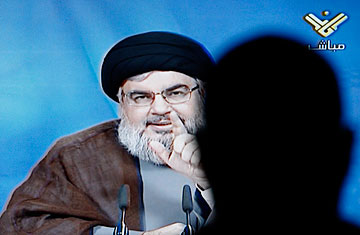
A man listens to Hizballah leader Sayyed Hassan Nasrallah speaking on television at a shop in the port city of Sidon, southern Lebanon, July 2, 2011.
(2 of 2)
Initially, Nasrallah confirmed press reports that the tribunal had interviewed several Hizballah members and said he would continue to cooperate with it to give it "a chance to be fair and professional".
In August, Nasrallah urged the tribunal to investigate the possibility that Israel assassinated Hariri. In late October, Nasrallah called for a total boycott of the tribunal, arguing that it had overreached itself by demanding from the Lebanese authorities reams of private information. In November, as speculation was reaching fever pitch that the indictments were imminent, Nasrallah served warning that the hands of anyone who attempted to arrest Hizballah's cadres would be "cut off".
The climactic moment came in January when Hizballah and its allies toppled the coalition government after Saad Hariri, the prime minister and son of the slain Rafik, refused to cease cooperation with the tribunal. A week later, the tribunal's chief prosecutor, Daniel Bellemare, submitted his indictments to a pre-trial approval process.
Lebanon is roughly equally divided over Hizballah's innocence or guilt in the Hariri assassination, matching partisan political loyalties. However, Hizballah's methodical and steadily intensifying propaganda campaign did sow a little doubt among that narrow strata of apolitical Lebanese some of whom wondered if Nasrallah might actually have a point. After all, ever since its inception in 2005, the UN investigation and the subsequent tribunal has been dogged by accusations of politicization.
But the more important consequence of Hizballah's hearts-and-minds campaign was to remove the shock value of the indictments and render them almost banal and anti-climactic. When the indictments were finally handed over last week, there was an atmosphere of complete indifference within the Hizballah-dominated suburbs of Beirut.
"We knew they were going to come after us anyway. It doesn't mean anything to us," said one Hizballah member.
There now follows a process in which the Lebanese authorities have 30 days to arrest the suspects and deliver them to the tribunal. If, as expected, the suspects are not caught, the tribunal can choose to proceed with trials in absentia. The tribunal tightened its internal by-laws on hearings in absentia late last year.
Indeed, rather than the indictments themselves, the trials will probably be the most uncomfortable moment for Hizballah when the prosecution finally delivers in court the evidence it has accumulated over the past six years.
Still, it is likely that Hizballah has further tricks up its sleeve to undermine the tribunal's credibility. Past media leaks have pointed to Lebanese police tracing a network of cellular phones connected to the Hariri murder which eventually led to the alleged Hizballah connection. However, last year, the Lebanese security agencies arrested several spies working for Israel who were employees of Lebanese fixed line and cellular companies. Watch, as they say, this space.
